|
|
|
Sort Order |
|
|
|
Items / Page
|
|
|
|
|
|
|
| Srl | Item |
| 1 |
ID:
181932
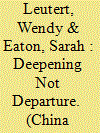

|
|
|
|
|
| Summary/Abstract |
To what extent has governance of China's state-owned economy changed under Xi Jinping? Against the background of momentous shifts in the political arena since 2012, some observe a decisive departure in Xi's approach to managing state-owned enterprises (SOEs): towards tight centralized control by the Chinese Communist Party and away from gradual marketization. Analysing the main aims and methods of SOE governance over the last two decades, we find that SOE policy under Xi exhibits a deepening of pre-existing trends rather than a departure. First, the essential vision of SOE functions articulated under Xi is strikingly consistent with that of his predecessors. Second, his administration's approach to governing SOEs is not novel; it relies on established mechanisms of bureaucratic design, the cadre management system, Party organizations and campaigns. While Xi has amplified Party-centred tools of command and control, this appears to be an incremental rather than a radical shift in approach.
|
|
|
|
|
|
|
|
|
|
|
|
|
|
|
|
| 2 |
ID:
122304
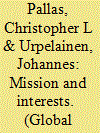

|
|
|
|
|
| Publication |
2013.
|
| Summary/Abstract |
International advocacy campaigns allow the concerns of disadvantaged groups in developing countries to reach policymakers. However, recent research has challenged the motivations of the Northern nongovernmental organizations involved and raised concerns about the impacts of North-South NGO partnerships on Southern NGO control. This article addresses these concerns by developing a typology of NGOs based on their financial incentives and the rigidity with which they adhere to their established organizational mission. It then models interactions between NGOs of different types as a strategic game. In the game, NGOs decide whether to enter international campaigns and, if so, manage campaign function to maximize payoff. "Participation-oriented" Northern NGOs, whose supporters reward them for undertaking advocacy, were found to run lengthy but ineffective campaigns and focus on publicity. "Outcome-oriented" groups, whose supporters reward them for measurable achievement, were found to generate higher campaign intensity but exit after either early victories or costly difficulties. The model is illustrated with a comparative analysis of two different campaigns regarding the Narmada Dam project.
|
|
|
|
|
|
|
|
|
|
|
|
|
|
|
|
| 3 |
ID:
161565
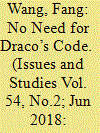

|
|
|
|
|
| Summary/Abstract |
The occasional “strike hard” campaigns against crime launched by the Chinese government provide an opportunity to isolate the separate effects of severity and certainty of punishment on the crime rate. The “strike hard” campaigns increase the severity of the punishment but keep the certainty of the punishment unchanged. We use provincial panel data from 1988 to 2015 to examine the impacts of the two strategies on the crime rate with pooled mean group models. The empirical results show that a significant decrease in crime rates is associated with greater certainty of detection, but greater severity has no significant effect. A 1% increase in the detection rate (a measurement of certainty) predicts about 2.7% lower crime rate. The results are robust even after considering the endogenous nature of punishment policies and controlling for the measurement error in the officially reported data.
|
|
|
|
|
|
|
|
|
|
|
|
|
|
|
|
| 4 |
ID:
192234
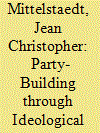

|
|
|
|
|
| Summary/Abstract |
Chinese Communist Party under Xi Jinping as part of an unfolding party-building project. Analyzing five campaigns conducted from 2013 to 2021, the study shows that they aimed to re-establish the linkage between the party center and party members, reinforce society’s connection to the party center, and crowd out competing narratives both inside the party and outside it. The article highlights the evolution of ideological campaigns in three phases, emphasizing how they developed from focusing on party members’ social environment toward positioning the party center and Xi Jinping at its core as the source of values and norms for party members and societal actors. The development of the party’s ideological campaigns under Xi Jinping thus has significant implications for the party’s model of governance, both internally and externally.
|
|
|
|
|
|
|
|
|
|
|
|
|
|
|
|
| 5 |
ID:
134399
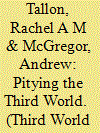

|
|
|
|
|
| Summary/Abstract |
The development sector appeals to emotions in its marketing and education material to raise awareness and funds for its work. Much of this material is now directed at schools, where young people form long-lasting opinions about development and the developing world. This paper draws upon research with 118 students in five New Zealand/Aotearoa secondary schools to show that young people are not passive receptors of development marketing and education. Instead, they question the activities of international ngos involved in aid work and how they are meant to feel or act in response. We examine these emotional responses of young people and the demoralising feelings of guilt, sadness and scepticism that arise, often alongside an innocent paternalism and a desire to help. We outline possibilities for more socially progressive forms of development education, based on the recognition that young people are questioning old ways of doing aid work and looking for something new. We challenge ngos to be part of new forms of global connectedness that disrupt old ‘us and them’ binaries based on difference, and instead to pursue new linkages based on shared feelings of empathy, friendship and social justice.
|
|
|
|
|
|
|
|
|
|
|
|
|
|
|
|
| 6 |
ID:
157192
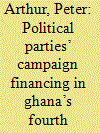

|
|
|
|
|
| Summary/Abstract |
The period from 1992 saw Ghana, under pressure from both internal and external sources, embark on the transition to democratic rule. Despite the strides, an issue that has the potential to undermine Ghana’s liberal democratic credentials has centred on the process of political party financing. The purpose of this paper is to analyse how the existing political party financing system in Ghana is negatively impacting on electoral competition and the country’s democratic process. Drawing on secondary sources, this paper shows that, given that it is political resources that drive party vibrancy and competitiveness, a level playing field in terms of public financing of political parties can help in electoral competition and the promotion of the democratic process in Ghana. However, the importance of transparency and accountability, as well as a legal framework that monitors, denounces, sanctions and punishes abuse in the use of public funds, would be crucial if success is to be attained.
|
|
|
|
|
|
|
|
|
|
|
|
|
|
|
|
| 7 |
ID:
151577


|
|
|
|
|
| Summary/Abstract |
Might authoritarian one-party systems experience something akin to party identification – or affective proximity to the Party – that waxes and wanes over time? Such cycles do not centre on elections but on the politics of succession, new policy initiatives and ad hoc housecleaning, and their focus would be officials within the system as opposed to the electorate outside it. I argue that a key mechanism animating such variation in party identification of Chinese Communist Party (CCP) cadres lies within the recurring rectification efforts seeking to temper these individuals and make them more submissive to the larger political goals of the Party centre. Such priming is largely an in-house phenomenon, taking place increasingly deeper within the CCP apparatus. This process tends to involve an extensive arsenal of institutional mechanisms that constitute a particularly big stick and within which pressures to comply can be uncomfortable, even excruciating. Normative elements of these movements, such as the language and substantive written materials used during study, analysis and self-criticism are predominantly in the service of enhancing the sheer domineering quality of the Party vis-à-vis the individuals that make up its ranks. I explore this through an examination of the three stresses (san jiang) campaign of 1998–2002.
|
|
|
|
|
|
|
|
|
|
|
|
|
|
|
|
| 8 |
ID:
152552
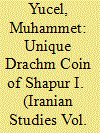

|
|
|
|
|
| Summary/Abstract |
The Sasanian king Shapur I held a ten year series of campaigns against the Roman Empire. Returning to Iran after these campaigns, in order to immortalize his victories he built a series of reliefs and gave broad information in his famous work, Ka’be-ye Zardosht. However, the term he used to define himself in these articles, “King of Kings of Iranians and non-Iranians,” was not used on coins, which has become a subject of discussion. This work aims to clarify such arguments based on a unique drachm belonging to Shapur I which is present in the Elazig Museum of Archaeology and Ethnography.
|
|
|
|
|
|
|
|
|
|
|
|
|
|
|
|
|
|
|
|
|